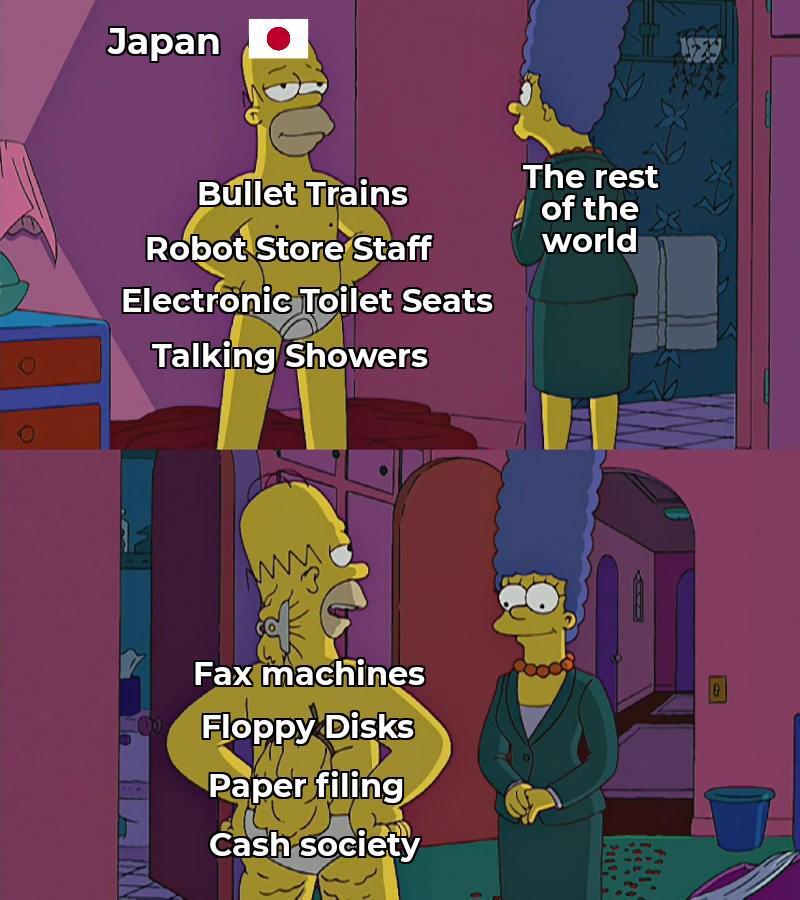this post was submitted on 28 Nov 2023
1155 points (95.5% liked)
memes
12108 readers
3647 users here now
Community rules
1. Be civil
No trolling, bigotry or other insulting / annoying behaviour
2. No politics
This is non-politics community. For political memes please go to [email protected]
3. No recent reposts
Check for reposts when posting a meme, you can only repost after 1 month
4. No bots
No bots without the express approval of the mods or the admins
5. No Spam/Ads
No advertisements or spam. This is an instance rule and the only way to live.
A collection of some classic Lemmy memes for your enjoyment
Sister communities
- [email protected] : Star Trek memes, chat and shitposts
- [email protected] : Lemmy Shitposts, anything and everything goes.
- [email protected] : Linux themed memes
- [email protected] : for those who love comic stories.
founded 2 years ago
MODERATORS
you are viewing a single comment's thread
view the rest of the comments
view the rest of the comments

Cash isn’t much use for making purchases online, which is also where an ever increasing amount of spending is done.
There’s no coin or note slot on my laptop, and contrary to the internet’s advice throwing money at my screen doesn’t seem to work either.
I used to be a big proponent of cash but with the bulk of my financial activity happening online now I can’t help it feeling a bit redundant.
Cash is needed nonetheless because when there is a downtime for whatever reason, it is not good if the only thing you have is a card.
Retaining some ability to spend and use cash is vital because otherwise, all our financial transactions are totally controlled by the banks, and they are completely untrustworthy. The cost is inconvenience.
Mullvad lets you mail them cash, but I don't think it's scalable nor fast enough to be widely used.
The last time I sent cash in the mail was in the early 00s when buying CDs from ebay. Wild that there is a service today that takes cash via mail.
They do it to make it as anonymous as possible
Yes that's fair enough, cash doesn't work online - but bitcoin is a better solution for online transactions than cards.
I mean, we haven't even got into the subject of data tracking. If you think Facebook is bad, consider for a moment how much your card provider knows about you. Banks and card companies have learned from Facebook, and data brokerage is now a trillion dollar industry - with only 8 billion people in the world (many of whom don't use the internet or have data being traded), that means your data is worth roughly $1,000 a year. Surely, as the manufacturer of the data, you should be getting some of that?!
Lol Bitcoin is not better than cards for online shopping, the only thing it's better for is buying whatever you're smoking.
Objectively, bitcoin is better for online transactions. It's not even all that safe for buying drugs - every transaction is recorded permanently in an open ledger, so it's actually much easier to trace (at least up to the end points where traditional currency is exchanged).
It might be less widely accepted, but that's only because of how insidiously endemic MasterCard and VISA are.
How is bitcoin objectively better? That's a pretty bold statement that needs some backing arguments.
They both have pros and cons, but until BTC have garanteed near instanteneous transaction confirmation, I don't see how that would work at the grocery store for example.
Bitcoin is objectively better based on the way it works. Subjectively, with the established infrastructure behind it, traditional card payments are artificially better - purely because of convenience. But on a level playing field bitcoin works better and is less susceptible to negative influences.
The grocery store is not typically an online transaction. I did specify online transactions. For buying groceries online, bitcoin would be better - there are no fees when trading bitcoin. When trading cash, there are no fees.
When putting cash into a business account, there are fees, and as almost all businesses put their money into an account they pay these fees. These cash deposit fees and card processing fees have grown in such a way as to entrap nearly all commercial transactions.
Objectively, it's better if there aren't fees, particularly when the fees are not proportional to the actual service the fees are supposed to represent.
That's a weird take. A system is better because it's free?
I re-read your comment and I missed the fact that you said online buying, sorry about that.
One advantage of traditional CC over Bitcoin is buyer insurance against fraud. If someone gets a hold of your Bitcoin wallet, he can take out everything and you have no recourse.
If someone steal your credit card and make fraudulent purchases, the transactions will be cancelled and you won't be left on the hook.
you're wrong for valuing peace of mind.
/s
The credit companies do not insure against fraud, they simply take the money out of the merchant account and put it back into yours. Now it's the merchant who has no recourse, if they have already shipped the product. So the only difference between CC and crypto is who is typically left holding an empty bag in case of theft - the payer or the payee. Certainly not the banks!
I'd argue in terms of assigning responsibility, it seems more fair to expect you the customer to keep your digital wallet secure from thieves, than to expect the merchant to try guess every time whether the visitor to their online store happens to be using a stolen credit card.
That's credit, most online purchases are made with debit cards.
That's debit as well. I have protection against fraud on my debit card.
Aaaaaand now you've lost me.
Aaaaand how?
For one, Bitcoin is inefficient and energy intensive technology.